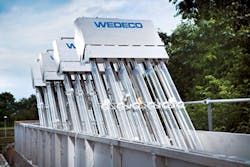Water Reuse: Sustainable Golf Course Irrigation
About the author: Kirsten Meyer is product manager, UV Product & Application Management for Xylem. Meyer can be reached at [email protected] or +49 5221 930.200.
The clear, present and growing challenge of global water scarcity is hindering the ability to deliver water where it is needed—for both potable and non-potable use. Communities are responding to this challenge with solutions including storage, conservation, education, groundwater management and water reuse. Water reuse is a proven approach that reduces vulnerability to drought and provides environmental co-benefits. Successful water reuse projects are making it easier for industries and municipalities to reclaim wastewater for beneficial purposes, such as industrial uses, environmental restoration and irrigation.
The state of Texas recently emerged from a period of severe drought lasting four years. Water reuse has been identified as an important component of the future water supply portfolio for the state to support population growth and continued economic development. According to the 2012 Texas State Water Plan, water reuse will provide approximately 1.53 million acre-ft per year of water supply statewide by the year 2060 and will meet approximately 18% of the state’s water needs. A number of projects are under way across Texas to ensure the smarter use of water and advance water reuse for potable and non-potable purposes.
Disinfection for Reuse
As part of one such project, Xylem recently won a $1.25 million contract to provide its Wedeco Duron ultraviolet (UV) system, an advanced wastewater treatment technology, for irrigation of a golf course in the city of McAllen, Texas. Golf courses in the U.S. use approximately 2.08 billion gal per day of water for irrigation, or 0.5% of total daily water consumption across the country.
Xylem provided treatment technology to the South Wastewater Treatment Plant in McAllen. The plant delivers 240 million gal of reclaimed, treated wastewater annually to the McAllen Palm View Golf Course for irrigation purposes. The UV system is an energy-efficient solution that eliminates the need for chemicals to disinfect the wastewater and enables increased water reuse. The technology will help to ensure consistent quality at the plant as it treats up to 10 million gal per day (mgd) of wastewater prior to discharge or reuse.
With the UV system, potentially harmful pathogens are rendered harmless before the treated wastewater is returned to the environment or used for irrigation. By using UV technology at the South Wastewater Treatment Plant, there is no need to store large quantities of potentially hazardous chlorine on site for effluent disinfection in the city of 130,000 residents.
System Operation & Maintenance
The UV system combines intelligent control with UV lamp and ballast technology, ensuring the correct dose and reducing energy consumption by up to 30% compared to conventional open-channel UV systems. The sensor-controlled system monitors operating conditions in real time—flow, UV transmittance and UV intensity—and adjusts the energy consumption to the minimum needed to meet dosing requirements. The 600-W Ecoray UV lamps used in the system are installed inclined at 45 degrees, which delivers performance and facilitates easy maintenance—all key factors in the selection of the technology for the South Wastewater Treatment Plant.
The system enables the lamps to be easily retrieved for maintenance, which will significantly reduce the maintenance effort of the system. Its performance validation as well as the intelligent autonomous control will help the plant meet permit requirements. Cost-efficient construction costs and ease of installation also factored into the decision to choose this technology.
The technology will help the system to produce treated water with a peak two hour flow of 31 mgd. Each UV train will handle 15.5 mgd with a third train providing 50% standby capacity. In addition, Flygt compact submersible propeller pumps will be used to recycle water in the aeration basins. Using compact, direct-drive motors and fewer components, the pumps are designed to transport large volumes of water at low heads.
The installation process at the plant began in March 2015 with the new system expected to be in operation by January 2018. CSA Construction is responsible for upgrading the plant.
Water reuse projects such as this draw on existing technologies to mitigate the impact of drought by producing high-quality water at a lower lifecycle cost, with energy efficient and sustainable solutions.
Download: Here
